-
Posts
18 -
Joined
-
Last visited
Content Type
Forums
Store
Crowdfunding
Applications
Events
Raffles
Community Map
Posts posted by Johann Pascher
-
-
I looks like there are more as one way to setup kodi on orange pipc.
The latest version 17.1 of kodi with hardware exsaleration would be preferable.
I wanted a setup where i could use the on board ir and some Remote i already own.
Then an usb Keyboard.
And i did not want that kodi starts at system start.
I also wanted VNC be usable to do a login via VNC to be able to remote control from my Leptop.
I did get Kodi 15.2 working but with drawbacks:
Video is not smooth, not relay nice to view. VNC and IR did work and i could go back to the desktop to start internet browser or something else, all rather slow.
Colors of the HDMI TV look not very normal to much red, if i compare it with the Fire-TV stick on with the newer kodi 17.1 is as well installed.
(Beside this installation of kodi on the firer-TV stick was easy. Also a bit outdated Gide for installation: https://www.tweaking4all.com/home-theatre/xbmc/kodi-on-amazon-fire-tv-firestarter/
one needs the 32 bit version not the 64 bit of kodi. Drawback: It is android and no VNC and no USB Keyboard. Remote is the one that comes with Fire-stick)
If someone want to use only the kodi 17,1 or 18 on orangepi there is a way to do it on a Armbian Server. Unfortunately preset info is in Russion language. And color and speed of Videos is bad as on the other setup https://ua3nbw.ru/all/kodi-17-1-krypton-na-orange-pi-s-opengl-es-2-0/ .
An other approach is to use OPENelec. Kodi version is 15.1 i got it working with Keyboard and IR remote. Worse drawback no VNC possible since there is also no normal desktop root login. Speed of Videos was a little bit better color also bad. Remote control a bit easier to set up as on Armbin desktop. Uses also Lirc an ir ir_keytable. Kernal Modul for ir (modeprobe sunix-cir) must be loaded first by editing /storage/.config/autostart.sh lircd.conf is on a different place in /storage/.config/lircd.conf Lircmap.xml is on the same place as with Armbian installation.
One can find everything in the OPENelec wiki. How to setup ssh, how to edit autostart.sh and how Remots can be set up. Note: In the wiki the circumstance that the IR modul must be loaded via Autostart.sh is not mentioned!
Also missing is an explanation how lircd.conf and Lircmap.xml should link to each other. It is also possible to have multiple remotes as well in the Arrmbian or in the OPENelec.
How? Make more as one lircd.conf file for each Remote control you want to use. Rename each file. Make a new lircd.conf file that contains only the includes for the other files.
include "./lircd.conf.remotename"
include "./lircd.conf.remotename2"
Replace one line i each lircd.conf.remotename: name /etc/lircd.config (name /storage/.config/lircd.conf) to name remotenamex the name of your remote. This name must have a representation in the Lircmap.xml
Here may example with thee remote controls LG, SAMSUNG, PHILIPS:
More to the subject lirkd on armbian:
-
I am looking for more fundamental background information.
How is the armbian project organized?
Is there a repository with tracing system as i am used to on other projects like https://freetz.org/wiki/freetz?
-
What worked?
This worked for me:
-
Board name?
On orangepipc+ ir red receiver is on board and the module used is named sunix-cir
-
It is also possible to use VNC Client on the PC and server on orange pipc+ to get the Screen of kodi to the PC. http://www.tightvnc.com/download/2.8.3/tvnjviewer-2.8.3-bin-gnugpl.zip
extract the file tightvnc-viewer.jar and put it on the desktop or elsewhere to klick on it for starting.
TightVNC is just a single java executable, needs java to be installed on the PC.
On orange pi:
sudo apt-get -y install x11vnc vnc4server xinetd vnc-java xfonts-base
sudo x11vnc -storepasswd yourpassword /etc/x11vnc.passThis two lines are for starting. You can but this also to etc/rc.local so VNC starts every time the Linux is rebooted.
vncserver # first time use a password has to be setup as well, just follow the Questions presented after invoking
x11vnc -display :0 &My be this works fort you too.
-
I also have orangepipc+ and i use the desktop version of ARMBIAN 5.25 stable Ubuntu 16.04.1 LTS 3.4.113-sun8i
i don't have an problem with firefox at all. I suggest to do an update.
-
If someone has enough time to look into it, he should do it. I think this guy will keep on anyway, unfortunately he speaks Russian. I my native language is German.
I don't have real need for kodi 18 and hardware acceleratean. I only did think it would make more sense to have the latest version of kodi with h/w acceleration. For me the kodi 15 on orange pi is all i need so far. Don't use it realy much but since i have this board i gave it a try. Had problems getting the IR control working but i fixed it.
-
I tested this here, is some Russian page, his image works if you use orange pi only for kodi, i wanted it with the desktop. I use a heats-sink on the cpu.
http://ua3nbw.ru/all/sborka-videopleera-mpv-with-hardware-decoding/
Page is a bit difficult to read because goole translates from Russian.
-
I have kodi on ARMBIAN 5.25 stable Ubuntu 16.04.1 LTS 3.4.113-sun8i
orangepipc+ board running tested the latest version kodi alfa as well but kodi 17 and 18 don only work on a headless server with codi alone installed.
Version 15 of Kodi can bi installed easy, had only some problem with ma remote control.
See may thread about it:
-
-
Guide: Configuring Orange PI PC to receive IR/InfraRed and fix Lirc
I also show how VNC can be used to do remote control on orangepipc+ on the example of kodi.
Should be the same on orangepipc boards.
If a USB IR receiver is used the problem ma not be present at all, but i use the on-board IR receiver.
Is dirty work around, if someone knows how to fix it correctly please tell!
(I installed the latest version of LIRC 0.9.4b from the source code and compiled it, but it din not fix the problem. So i stay with the version ARMBIAN 5.25 stable Ubuntu 16.04.1 LTS 3.4.113-sun8i comes with.)
If the LIRC tool irw cant be started and reports: (See also the doku for ubuntu and lirk https://wiki.ubuntuusers.de/Lirc/#lirc.fdi)
No such file or directory
The bug is present, and the lirc demon also want work.
The directory /var/~run is a symbolic link and somehow the lirk demon has a problem with it.
The proper way is to use a option for the lircd demon.
There is an option for the demon to use a different output directory as the default /var/run/lirc --output <output socket>
If used with option --output specified make a directory that lirc demon can use:
mkdir /run/lirc
(Unfortunately the tool irexec has no option for supplying a path to the socket. The newer lirc version 9.0.4b can use an environment variable for this.)
The problem may only be present in some cases.
--------------------------------------------------------------------------------------------------------------------------
The following description is how one can test step by step that IR remote control is working:
Make sure nothing is running stopping the process is needed:
root@orangepipcplus:~# /etc/init.d/lirc stop
[ ok ] Stopping lirc (via systemctl): lirc.service.Install additional tool we use later on.
apt-get install ir-keytable
Start kernal modul (http://linux-sunxi.org/IR) sunix_cir
modprobe sunxi-cir
(or edit /etc/modules and aktiviere sunxi-cir and reboot.)We need to find out some info:
cat /proc/bus/input/devices
(should list sunix-ir if not the Kernal modul is not loaded)
I: Bus=0019 Vendor=0001 Product=0001 Version=0100
N: Name="sunxi-ir"
P: Phys=sunxi-ir/input1
S: Sysfs=/devices/virtual/rc/rc0/input3
U: Uniq=
H: Handlers=kbd event3 cpufreq_interactive
B: PROP=0
B: EV=100013
B: KEY=1000000 0 0 0 0
B: MSC=10lsmode should list sunix_cir
root@orangepipcplus:~# lsmod
Module Size Used by
ir_lirc_codec 3650 0
lirc_dev 7834 1 ir_lirc_codec
ir_mce_kbd_decoder 2885 0
ir_sanyo_decoder 1480 0
ir_sony_decoder 1422 0
ir_jvc_decoder 1452 0
ir_rc6_decoder 1941 0
ir_rc5_decoder 1412 0
ir_nec_decoder 1556 0
sunxi_cir 1601 0
rc_core 12727 10 ir_lirc_codec,ir_rc5_decoder,ir_nec_decoder,ir_sony_decoder,sunxi_cir,ir_mce_kbd_decoder,ir_jvc_decoder,ir_rc6_decoder,ir_sanyo_decoder
mali_drm 2732 1
drm 178255 2 mali_drm
pcf8591 3363 0
bmp085 3487 0
mali 123146 0
ump 29379 3 mali
8189fs 1050451 0
btrfs 712409 0
root@orangepipcplus:~# ^C
root@orangepipcplus:~#
The two commands above can be left out because ir-ketable reports all we need! ir-keytable also may be used instead or on combination with LIRC. See more info on https://wiki.ubuntuusers.de/Kodi_Remote/ and http://www.yavdr.org/documentation/de/ch02s03.html#idp6463520.
root@orangepipcplus:~# ir-keytable
Found /sys/class/rc/rc0/ (/dev/input/event3) with:
Driver sunxi-ir, table rc-empty
Supported protocols: lirc rc-5 jvc sony nec sanyo mce-kbd rc-6
Enabled protocols: lirc rc-5 jvc sony nec sanyo mce-kbd rc-6
Name: sunxi-ir
bus: 25, vendor/product: 0001:0001, version: 0x0100
Repeat delay = 500 ms, repeat period = 125 ms
root@orangepipcplus:~#
We need to remember (/dev/input/event3) this can be different on your system.The following line also can be used for testing remote control functionality. lirc rc-5 jvc sony nec sanyo mce-kbd rc-6 ... are RC protocols as shown above additional or only one may be used to verify witch protocol your remote control is using.
ir-keytable -c -p NEC,RC-5,RC-6,JVC,SONY, SANYO, MEC-KGB -t
(ir-keytable -c -p NEC -t)
(ir-keytable -c -p RC-5 -t)
Output looks like this with mine if buttons on the remote pressed:
Old keytable cleared
Protocols changed to rc-5 jvc sony nec rc-6
Testing events. Please, press CTRL-C to abort.
1493833179.145623: event type EV_MSC(0x04): scancode = 0x406
1493833179.145637: event type EV_SYN(0x00).
1493833180.683349: event type EV_MSC(0x04): scancode = 0x444
1493833180.683363: event type EV_SYN(0x00).
1493833181.529723: event type EV_MSC(0x04): scancode = 0x407
1493833181.529735: event type EV_SYN(0x00).Up to now we just used the kernal Modul and not LIRC.
Reboot for safety!
reboot
systemctl daemon-reload && /etc/init.d/lirc stop
We start the demon in a n extra terminal window with ssh and putty in my case!
root@orangepipcplus:~# lircd --nodaemon --device /dev/lirc0 --driver default --output /run/lirc/lircd
lircd-0.9.0[4614]: lircd(default) ready, using /run/lirc/lircdDon't enter other command line commends within this window is only for watching what the demon is doing.
Go back to the first terminal window and enter more commands:Install additional optional tool ncat with:
( apt-get install nmap
ncat and irw can be used for the same task.
/usr/bin/ncat -U /run/lirc/lircd )
/usr/bin/irw /run/lirc/lircdroot@orangepipcplus:~# irw /run/lirc/lircd
0000000020df22dd 04 KEY_OK LG-AKB72915207
0000000020df609f 00 KEY_RIGHT LG-AKB72915207
0000000020df22dd 00 KEY_OK LG-AKB72915207
0000000020df02fd 01 KEY_UP LG-AKB72915207
0000000020dfe01f 00 KEY_LEFT LG-AKB72915207
0000000020df827d 01 KEY_DOWN LG-AKB72915207
if no out put is generated something is wrong with the file /etc/lirc/lircd.conf
The following command can be used to generate a functional /etc/lirc/lircd.conf Be aware that not all remote control's will work. Have more as one for testing.
systemctl daemon-reload && /etc/init.d/lirc stop irrecord -d /dev/lirc0 /etc/lirc/lircd.conf
My generated file looks like this:
# Please make this file available to others
# by sending it to <lirc@bartelmus.de>
#
# this config file was automatically generated
# using lirc-0.9.0(default) on Wed May 3 13:58:01 2017
#
# contributed by
#
# brand: /etc/lirc/lircd5.conf
# model no. of remote control:
# devices being controlled by this remote:
#begin remote
name LG-AKB72915207
bits 16
flags SPACE_ENC|CONST_LENGTH
eps 30
aeps 100header 9022 4488
one 552 1690
zero 552 578
ptrail 552
repeat 9017 2252
pre_data_bits 16
pre_data 0x20DF
gap 141229
toggle_bit_mask 0xCECEbegin codes
KEY_OK 0x22DD
KEY_DOWN 0x827D
KEY_UP 0x02FD
KEY_LEFT 0xE01F
KEY_RIGHT 0x609F
KEY_VOLUMEUP 0x40BF
KEY_VOLUMEDOWN 0xC23D
end codesend remote
Output on the demon terminal window is like this:
Last login: Wed May 3 18:02:03 2017 from 192.168.178.49
root@orangepipcplus:~# modprobe sunxi-cir
root@orangepipcplus:~# lircd --nodaemon --device /dev/lirc0 --driver default
lircd-0.9.0[2763]: lircd(default) ready, using /var/run/lirc/lircd
lircd-0.9.0[2763]: accepted new client on /var/run/lirc/lircd
lircd-0.9.0[2763]: removed client
Now you can close the demon window and run the demon in the background without the --nodaemon option
lircd --device /dev/lirc0 --driver default
Keep in mind with this command line the demon runs without /etc/lirc/hardware.conf file!
Here is my harware.conf file:
REMOTE="None"
REMOTE_MODULES="sunix-cir"
REMOTE_DRIVER="default"
REMOTE_DEVICE="/dev/lirc0"
REMOTE_SOCKET=""
REMOTE_LIRCD_CONF=""
REMOTE_LIRCD_ARGS=""
TRANSMITTER="None"
TRANSMITTER_MODULES="sunix-cir"
TRANSMITTER_DRIVER="default"
TRANSMITTER_DEVICE="/dev/lirc0"
TRANSMITTER_SOCKET=""
TRANSMITTER_LIRCD_CONF=""
TRANSMITTER_LIRCD_ARGS=""
START_LIRCD="true"
START_LIRCMD="false"
LOAD_MODULES="true"
LIRCMD_CONF=""
FORCE_NONINTERACTIVE_RECONFIGURATION=""The next step is that in the ubunto or may be also in the debian setup a script /init.d/lirc is in use to start the service in the background.
Only this script uses the file /etc/hardware.conf. This script is extremely suspect and may be one of the reasons way in some cases problems arise.
Finally i set the variable LOAD_MODULES="false" and activated the modul in the file /etc/mudules.
echo sunix-cir | sudo tee -a /etc/modules
reboot.
This led to the circumstance that the service stated at reboot.
Have a look at /var/log/syslog to find out if the demon starts as it should.
USING with kodi:
If sunix-cir and lircd is working popper what it was not in may case and the hardware.conf is as it was from a clean install:
sed -i s/'#DISABLE_KERNEL_SUPPORT="true"'/'DISABLE_KERNEL_SUPPORT="false"'/ /etc/lirc/hardware.conf;sed -i s/'START_LIRCD="false"'/'START_LIRCD="true"'/ /etc/lirc/hardware.conf;apt-get install kodi #install kodi
systemctl daemon-reload && /etc/init.d/lirc stop
rm -rf /etc/lirc/lircd.conf
irrecord -H default -d /dev/lirc0 /etc/lirc/lircd.conf # Record your remote or use a config-file you already have. Keep in mind the names for keys are limited and must correspond to the names used in ~/.kodi/userdata/Lircmap.xmlsystemctl daemon-reload && /etc/init.d/lirc start
(Now logged in as normal user that was set up when first time Armbian was booted!)
(find / -name Lircmap.xml #find the location of a template-file that makes the final key mapping for kodi)
cp /usr/share/kodi/system/Lircmap.xml ~/.kodi/userdata/Lircmap.xml #copy the template to your user directory
sudo sed -i s#'</etc/lirc/lircd.config>'#'<SAMSUNG>'# /etc/lirc/lircd.config # Replace the Name of your remote in lircd.config to "SAMSUNG" or what you want.
sudo sed -i s#'<remote device="mceusb">'#'<remote device="SAMSUNG">'# ~/.kodi/userdata/Lircmap.xml # Also adapt the NAME to the same in Lircmap.xml
reboot----------------------------------------------------------------------------------------------------------------
If the demon does not do the loading of the modul sunix-cir as in my case i removed the file:
rm /etc/init.d/lirc # leads to the case that the demon is not started at boot time, etc/hardware.conf is not in use any more ether.
I added the following three lines to /etc/rc.local before the final exit 0
if [ -d "/run/lirc" ]; then rm -Rf /run/lirc; fi
mkdir -pv /run/lirc
/usr/sbin/lircd --driver=default --device=/dev/lirc0 --uinput --output=/var/run/lirc/lircd --pidfile=/var/run/lirc/lircd.pid /etc/lirc/lircd.confAnd edited the file /etc/modules by removing the # in front of sunix-cir
to start sunix-cir modul at boot time.
Or invoke this line to add an additional line.
echo sunix-cir | sudo tee -a /etc/modules
reboot
You also can use an add-on in kodi to edit the keys in use. -> progamms -> add-ons -> Keymap Editor
(install it first in kodi: system -> add-on -> install from repository -> Keymap Editor)
Kodi Sound:
Needs a additional file in /etc/asound.conf #See http://alpha6.ru/blog/2016/10/09/orange-pi-armbian-kodi/
pcm.snd_card { type hw card 1 device 0 }
ctl.snd_card { type hw card 1 device 0 }
pcm.dmixer { type dmix ipc_key 1024 ipc_perm 0666 slave.pcm "snd_card" slave { period_time 0 period_size 1024 buffer_size 4096 rate 48000 format S32_LE channels 2 } bindings { 0 0 1 1 } }
It is also possible to use VNC Client on the PC and server on orange pipc+ to get the Screen of codi to the PC. http://www.tightvnc.com/download/2.8.3/tvnjviewer-2.8.3-bin-gnugpl.zip
extract the file tightvnc-viewer.jar and put it on the desktop or elsewhere to klick on it for starting.
TightVNC is just a single java executable, needs java to be installed on the PC.
On orange pi:
sudo apt-get -y install x11vnc vnc4server xinetd vnc-java xfonts-base
sudo x11vnc -storepasswd yourpassword /etc/x11vnc.passThis two lines are for starting, can but done also via etc/rc.local so VNC starts ever time the Linux is rebooted.
vncserver # first time use a password has to be setup as well, just follow the Questions presented after invoking
x11vnc -display :0 &I also installed kodi with lirkd on OPENelec lirkd is there installed a bit different. The socket directory is not on a linked path. /var/run/ the path /run/ is used instead.
This lead to the case that irw has not problem when it is invoked without explicit added path. I don't know why armbian must use this linked directory but insider may know why.
Kernel modul also has to be loaded at startup by adding modeprobe sunix-cir to /storage/.config/autostart.sh.
See also:
-
Additional info! There is absolutely nothing wrong with the WIFI if network manager and wicd is in use. My Problem was on my side. I connected with the PC via WIFI to the router and from the router also via WIFI to the orangepipc+ As i did show above if ports forwarding was set up in the router i could connect from outside and from my PC. but way not directly?
In my fritz!box it war inhabited to communicate from one wifi interface to an other. First i configured the wifi on the orangepipc+ to a static address outside of the range DHCP uses.
Then i had to go to the WLAN page of my fritzbox and activate the comunication between WIFI clients. On other routers this may be a setting like this: Wireless -> Advanced Wireless Settings -> AP Isolation
-
So finally i found a way around the problem. Just to confirm all what i told above is true the behavior is not as expected. It is possible to use the wifi without eth0 configured if one uses some other way to to connect to the board for setup, in my case i used the SSH Terminal via serial link. Configured only the wifi with the nmtui tool as client. ( i t also works with the eth0 configured and disconnected lan wire) Set the power management of wifi to always on. By:
To turn off power management, go to
/etc/NetworkManager/conf.d/default-wifi-powersave-on.confand you will see[connection] wifi.powersave = 2Change the
3to a2and reboot.Then run
iwconfigand if it worked you should seePower Management:off.Then i added the scripts below to
/etc/NetworkManager/dispatcher.d/cat 99set-reg-domain.sh #!/bin/bash status=`cat /sys/class/net/wlan0/operstate` /bin/bash -n /etc/default/crda && source /etc/default/crda if [[ $status == 'up' ]] then iw reg set $REGDOMAIN fiDon't know if it is relay needed, at this point still nothing changed.
I could connect to the inter net from the orange pi pc + without problem but not from the PC to the board as before.
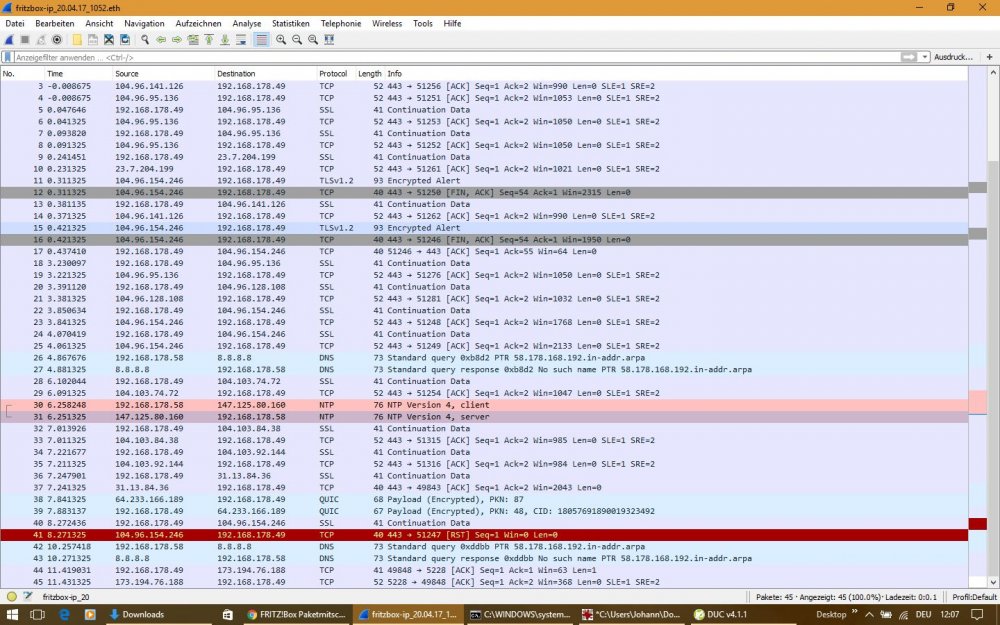
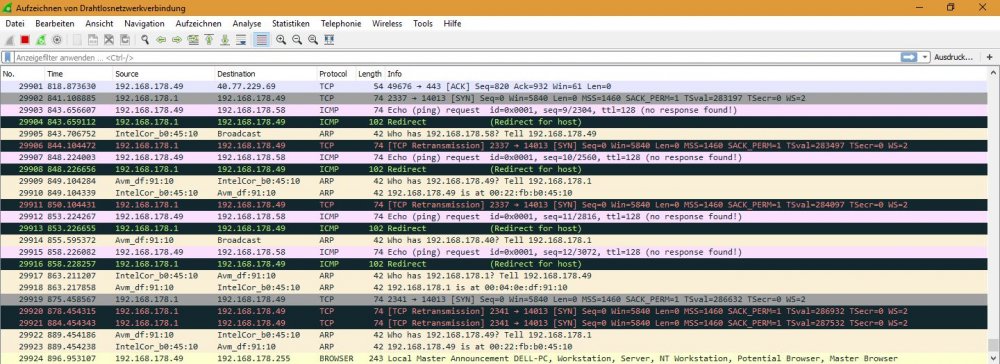
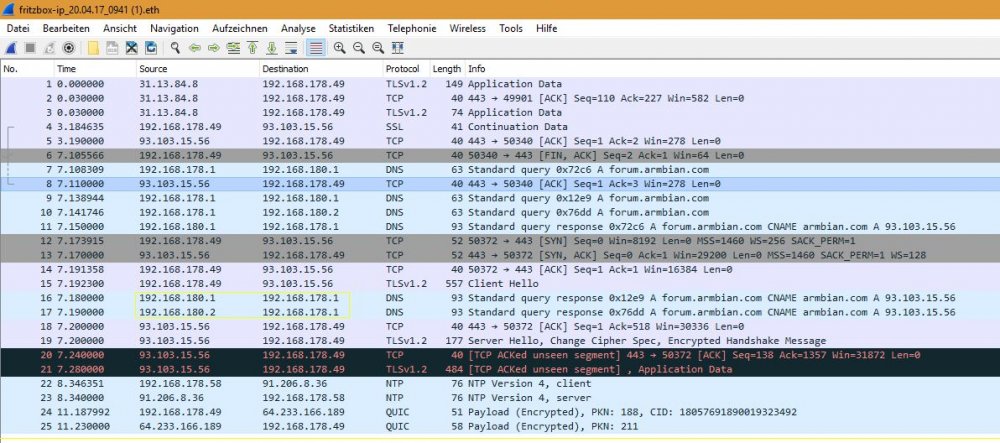
Then i did some tests with wireshak. I had a look way pinging cant get across the router. i Uses damps from the router to look int the problem. Nothing could be fond. Tareceroute from orangepi board to the PC worked ping did not work.
 .
.
Tacert from PC to the board did not work stopped at router.
So it looks like the route is just broken in one point form router to the orange board.
------------------------------------------------------------------------------------------------------
So i stated to setup an DYNsys entry on the router.
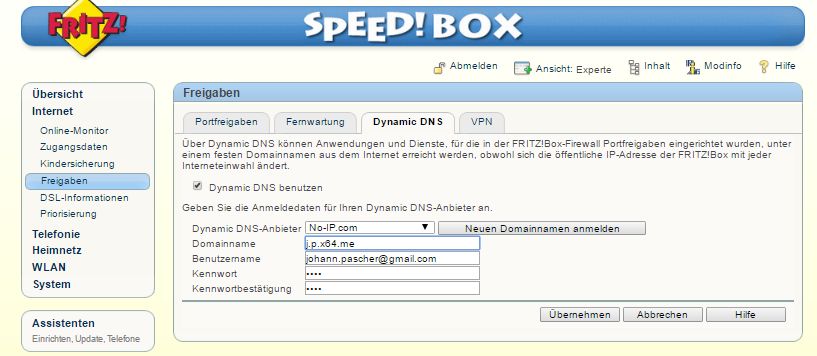
Entered the port forwarding and finally all can be reached from my PC with the correct port entry's in the router.

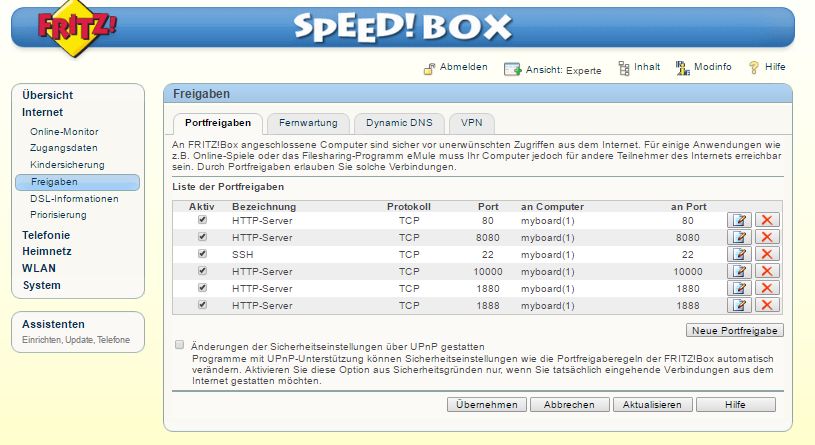
But i cant see ans reason way it should not work without DYNsys and port-forwarding on the local net. May be i am wrong and this is just the correct way to do it. If someone can tell me where my conclusions are wrong pleas to it.
Thank to tKaiser for Answering and all other an the subject to get this all working. here are some more pictures of my setup.
-
Thank you for taking time to answer! Unfortunately this does not work i use a serial console link via putty for testing and i also checked just to configure wifi without eth0 no way to connect. I have red the thread you did post before and tried everything suggested. Behavior is the same as with both interfaces configured. Just wifi configured i can ping from router to the board and from the board to the router (W900 with serial console connected). i can ping from router to my pc and from my pc to the router but not form orangepi pc + board to the PC. Absolutely no problem to connect from orangepi pc + board to the internet via wifi only. Ok i checked all again but there is definitely a problem. All is as i explained.
-
Cant get the wifi operate as i want it. i am using the nmtui tool for configuration.
The following logs are with Lan0 connected.
-------------------------------------------------------------------------------------
Welcome to ARMBIAN 5.25 stable Ubuntu 16.04.2 LTS 3.4.113-sun8i
System load: 0.43 Up time: 29 min
Memory usage: 27 % of 1000Mb IP: 192.168.178.19,192.168.178.58
CPU temp: 16°C
Usage of /: 12% of 28GLast login: Mon Apr 17 17:09:41 2017 from 192.168.178.49
root@myboard:~# route
Kernel IP routing table
Destination Gateway Genmask Flags Metric Ref Use Iface
default * 255.255.255.255 UH 600 0 0 wlan0
default gateway 0.0.0.0 UG 600 0 0 wlan0
192.168.178.0 * 255.255.255.0 U 100 0 0 eth0
192.168.178.0 * 255.255.255.0 U 600 0 0 wlan0
myboard * 255.255.255.255 UH 600 0 0 wlan0
myboard * 255.255.255.255 UH 100 0 0 eth0
root@myboard:~# ifconfig
eth0 Link encap:Ethernet HWaddr 32:57:92:08:e1:50
inet addr:192.168.178.20 Bcast:192.168.178.20 Mask:255.255.255.255
inet6 addr: fe80::3057:92ff:fe08:e150/64 Scope:Link
UP BROADCAST RUNNING MULTICAST MTU:1500 Metric:1
RX packets:162 errors:0 dropped:0 overruns:0 frame:0
TX packets:109 errors:0 dropped:0 overruns:0 carrier:0
collisions:0 txqueuelen:1000
RX bytes:15557 (15.5 KB) TX bytes:15099 (15.0 KB)
Interrupt:114lo Link encap:Local Loopback
inet addr:127.0.0.1 Mask:255.0.0.0
inet6 addr: ::1/128 Scope:Host
UP LOOPBACK RUNNING MTU:16436 Metric:1
RX packets:43 errors:0 dropped:0 overruns:0 frame:0
TX packets:43 errors:0 dropped:0 overruns:0 carrier:0
collisions:0 txqueuelen:0
RX bytes:3382 (3.3 KB) TX bytes:3382 (3.3 KB)wlan0 Link encap:Ethernet HWaddr 32:57:92:08:e1:51
inet addr:192.168.178.19 Bcast:192.168.178.19 Mask:255.255.255.255
inet6 addr: fe80::3057:92ff:fe08:e151/64 Scope:Link
UP BROADCAST RUNNING MULTICAST MTU:1500 Metric:1
RX packets:3437 errors:0 dropped:0 overruns:0 frame:0
TX packets:2201 errors:0 dropped:0 overruns:0 carrier:0
collisions:0 txqueuelen:1000
RX bytes:4039926 (4.0 MB) TX bytes:253307 (253.3 KB)
--------------------------------------------------------------------------------------------
-
SULVED!
Cant get the wifi operate as i want it. i am using the nmtui tool for configuration.
The following logs are with Lan0 connected.
-------------------------------------------------------------------------------------
Welcome to ARMBIAN 5.25 stable Ubuntu 16.04.2 LTS 3.4.113-sun8i
System load: 0.43 Up time: 29 min
Memory usage: 27 % of 1000Mb IP: 192.168.178.19,192.168.178.58
CPU temp: 16°C
Usage of /: 12% of 28GLast login: Mon Apr 17 17:09:41 2017 from 192.168.178.49
root@myboard:~# route
Kernel IP routing table
Destination Gateway Genmask Flags Metric Ref Use Iface
default * 255.255.255.255 UH 600 0 0 wlan0
default gateway 0.0.0.0 UG 600 0 0 wlan0
192.168.178.0 * 255.255.255.0 U 100 0 0 eth0
192.168.178.0 * 255.255.255.0 U 600 0 0 wlan0
myboard * 255.255.255.255 UH 600 0 0 wlan0
myboard * 255.255.255.255 UH 100 0 0 eth0
root@myboard:~# ifconfig
eth0 Link encap:Ethernet HWaddr 32:57:92:08:e1:50
inet addr:192.168.178.20 Bcast:192.168.178.20 Mask:255.255.255.255
inet6 addr: fe80::3057:92ff:fe08:e150/64 Scope:Link
UP BROADCAST RUNNING MULTICAST MTU:1500 Metric:1
RX packets:162 errors:0 dropped:0 overruns:0 frame:0
TX packets:109 errors:0 dropped:0 overruns:0 carrier:0
collisions:0 txqueuelen:1000
RX bytes:15557 (15.5 KB) TX bytes:15099 (15.0 KB)
Interrupt:114lo Link encap:Local Loopback
inet addr:127.0.0.1 Mask:255.0.0.0
inet6 addr: ::1/128 Scope:Host
UP LOOPBACK RUNNING MTU:16436 Metric:1
RX packets:43 errors:0 dropped:0 overruns:0 frame:0
TX packets:43 errors:0 dropped:0 overruns:0 carrier:0
collisions:0 txqueuelen:0
RX bytes:3382 (3.3 KB) TX bytes:3382 (3.3 KB)wlan0 Link encap:Ethernet HWaddr 32:57:92:08:e1:51
inet addr:192.168.178.19 Bcast:192.168.178.19 Mask:255.255.255.255
inet6 addr: fe80::3057:92ff:fe08:e151/64 Scope:Link
UP BROADCAST RUNNING MULTICAST MTU:1500 Metric:1
RX packets:3437 errors:0 dropped:0 overruns:0 frame:0
TX packets:2201 errors:0 dropped:0 overruns:0 carrier:0
collisions:0 txqueuelen:1000
RX bytes:4039926 (4.0 MB) TX bytes:253307 (253.3 KB)
--------------------------------------------------------------------------------------------
Booed without Lan0 connected:
Can ping from board to router 192.168.178.1, but not to pc connected to the router with ip 192.168.178.48wifi --> router (OK) --> PC ( no respond)
pc --> router (OK) --> Orange via wifi (no respond)
But keep in mind using a different board instead of orange pi i don't have a problem using this setup.
Please may someone look into this carefully and tell me what may be wrong.
For me it is definitely a routing problem, but what can i do to fix it. Board wifi is definitely up and running othervice i could not ping the router.
One my think it my be a problem with my router but way my DSL W900 has no way to configure routes, and it should work without fielding with the home router.
------------------------------------------------------------------------------------------------
root@myboard:~# route
Kernel IP routing table
Destination Gateway Genmask Flags Metric Ref Use Iface
default * 255.255.255.255 UH 600 0 0 wlan0
default gateway 0.0.0.0 UG 600 0 0 wlan0
192.168.178.0 * 255.255.255.0 U 600 0 0 wlan0
myboard * 255.255.255.255 UH 600 0 0 wlan0root@myboard:~# ifconfig
eth0 Link encap:Ethernet HWaddr 32:57:92:08:e1:50
UP BROADCAST RUNNING MULTICAST MTU:1500 Metric:1
RX packets:0 errors:0 dropped:0 overruns:0 frame:0
TX packets:3 errors:0 dropped:0 overruns:0 carrier:0
collisions:0 txqueuelen:1000
RX bytes:0 (0.0 TX bytes:238 (238.0
TX bytes:238 (238.0 
Interrupt:114lo Link encap:Local Loopback
inet addr:127.0.0.1 Mask:255.0.0.0
inet6 addr: ::1/128 Scope:Host
UP LOOPBACK RUNNING MTU:16436 Metric:1
RX packets:31 errors:0 dropped:0 overruns:0 frame:0
TX packets:31 errors:0 dropped:0 overruns:0 carrier:0
collisions:0 txqueuelen:0
RX bytes:2619 (2.6 KB) TX bytes:2619 (2.6 KB)wlan0 Link encap:Ethernet HWaddr 32:57:92:08:e1:51
inet addr:192.168.178.19 Bcast:192.168.178.19 Mask:255.255.255.255
inet6 addr: fe80::3057:92ff:fe08:e151/64 Scope:Link
UP BROADCAST RUNNING MULTICAST MTU:1500 Metric:1
RX packets:593 errors:0 dropped:0 overruns:0 frame:0
TX packets:447 errors:0 dropped:0 overruns:0 carrier:0
collisions:0 txqueuelen:1000
RX bytes:507934 (507.9 KB) TX bytes:612294 (61.2 KB)---------------------------------------------------------------------------------------------------



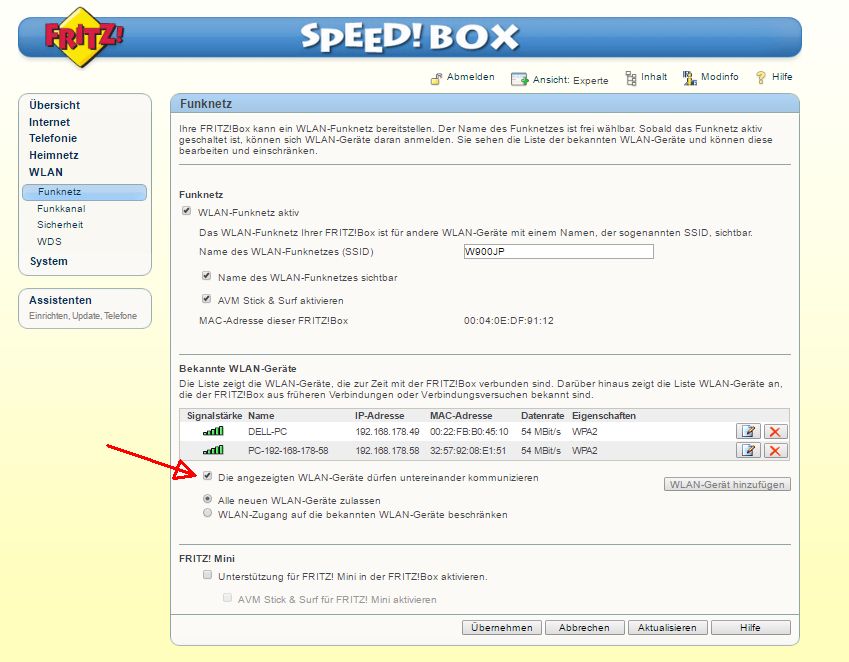
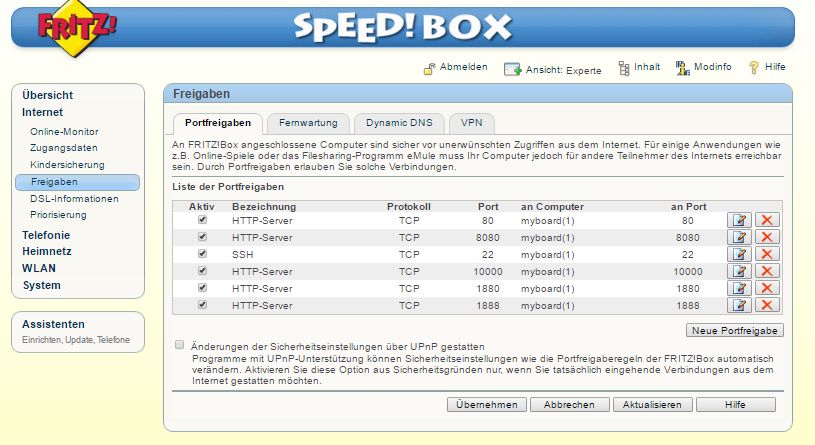
HDMI Color to much saturation
in Beginners
Posted
Did someone else notice the the color saturation is to high on HDMI if a Video is played?
Test video watch temperature of CPU and add a heatsink! May be the is an option for HDMI to change this?
Especially Faces in normal TV shows are far to red.
DISPLAY=:0 mpv --vo=vdpau --hwdec=vdpau --hwdec-codecs=all --fs http://ow.ly/10tB0C
Olso interesting would be to know how smooth the VIDEO rans is far to slow in ma case.